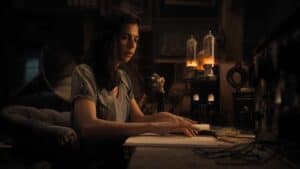Based on Anthony Doerr’s novel of the same name, All the Light We Cannot See tells the story of the hope and resilience of a French girl and a German soldier during WWII. The series is now streaming on Netflix.
Story
In August of 1944, in Nazi-occupied Saint-Malo, a girl named Marie-Laure LeBlanc reads a book on the radio and sends messages to her father, hoping that he will be listening to her wherever he is.
Broadcasting is punishable by death in Nazi-occupied regions, but Marie still does it because she is working for the French Resistance and sending coded messages to the Allies under the guise of reading.
A German soldier, Werner Pfennig, used to listen to the broadcast of a man, the Professor, when he was young, even though it was forbidden to listen to foreign broadcasts in Nazi Germany.
At a time when everyone was busy giving their opinions, the Professor gave children the truth and preached peace. Werner still tunes to that frequency, but instead of the Professor, he hears Marie’s voice now.
Werner is a genius radio operator. His job is to catch the people who broadcast illegally, but Werner decides to disobey orders to protect Marie, as it is clear that she, too, listened to the Professor and is now following in his footsteps.
Then there is Reinhold von Rumpel, a German high-ranking officer, who is looking for Marie, as he believes that she possesses something that he wants. He has not been able to find Marie because the people of Saint-Malo refuse to cooperate with him.
The Americans have come to free France, but as long as the Germans are in Saint-Malo, both Marie and Werner are in danger. Will Werner meet the girl whose voice has been giving him hope, and more importantly, will they survive the war?
Performances
One cannot help but appreciate the sincerity with which Aria Mia Loberti plays Marie. She makes the audience want to listen to Marie on the radio. With a better script, the actor might have given an unforgettable performance. Nell Sutton, who plays a younger Marie, is as impressive as she is adorable.
Louis Hofmann plays Werner, and his performance is passable at best. While Mark Ruffalo and Hugh Laurie give adequate performances, Lars Eidinger, who plays a hysterical Reinhold von Rumpel, evokes laughter rather than fear and dread.
Positives
Marie’s relationship with her father is truly heartwarming. From keeping her informed about everything that is happening around them to mapping a whole city for her, Daniel’s love for Marie is winsome.
In the show, the madness of war and hatred of the other is contrasted with the sense and compassion of people like Marie, Werner, Etienne, and Madam Manec. When the two opposites are seen side by side, all wars seem unnecessary and vile.
The show depicts how the Nazis conditioned children and turned soldiers into heartless machines who never questioned the orders given to them. Werner is a threat to the fascist regime, as they failed to strip him of his humanity at the National Institute, so he is one of the few German soldiers who can see reason.
Negatives
The show repeats its message many times and makes everything too apparent, as if the audience is incapable of reaching the same conclusions on their own. A subtler approach would have benefited the show.
Similarly, there are times when the show is overstuffed with details. For instance, the villain talks about why Marie and Daniel moved to Saint-Malo, and in the very next episode, the show depicts the same events in great detail.
Detailed accounts of the past leave little space for important events. Perhaps that is why none of the emotional scenes move the audience. Unfortunately, even character deaths do not have the intended impact.
The show overdramatizes events, and due to that, it is hard to take them seriously. There is a scene in which the villain not only warns the protagonist of his next move and gives her ample time to prepare but also dramatically counts down the seconds before he makes the said move.
Most characters in the show are either brave people fighting for freedom or cruel Nazis. All the Nazi characters are similar with hardly any distinction. A show about WWII without complex characters is unsatisfactory.
Furthermore, the show’s depiction of the Second World War lacks the intensity that would have given it depth. The brutal reality of war is missing from the lovely France of the show. The depiction makes it seem somewhat trivial, and WWII was anything but trivial.
Verdict
All the Light We Cannot See had the potential to be a great show, but it could not be great because it lacks complexity, intensity, and good characterization. It ended up being just another middling drama due to the showmaker’s choices.
All the Light We Cannot See

Director: Shawn Levy
Date Created: 2023-11-02 11:32
3
Also Read: Nuovo Olimpo review: A sweet and sad romantic slog

